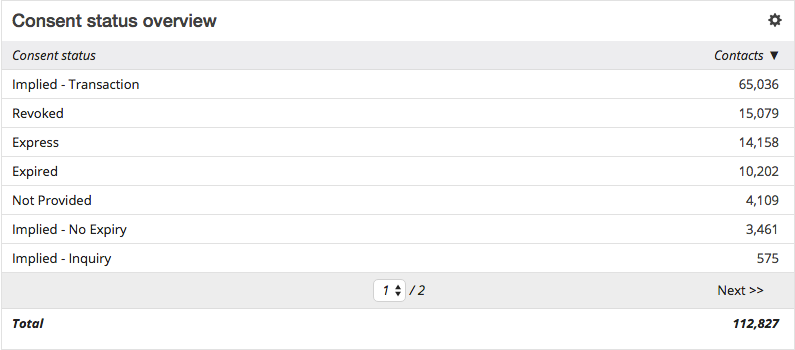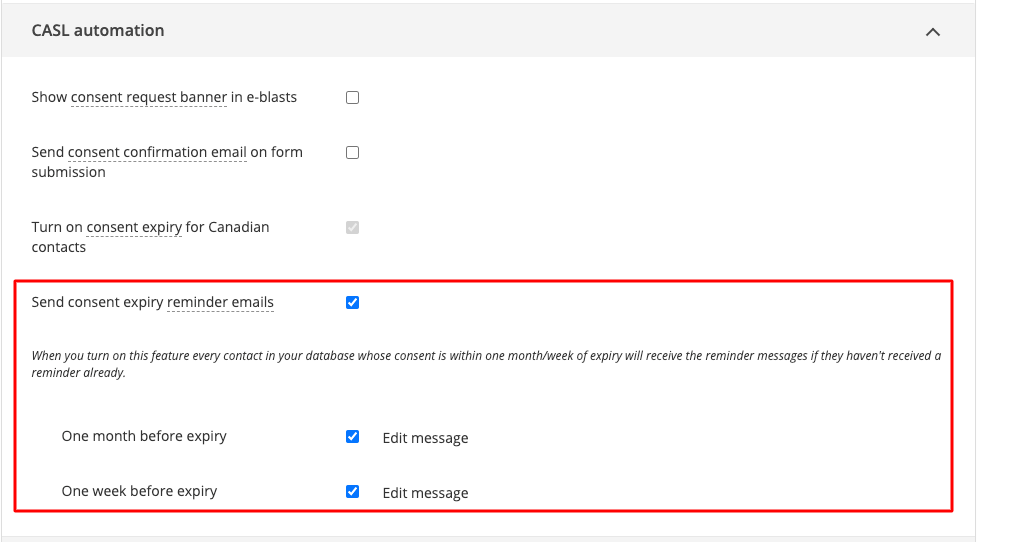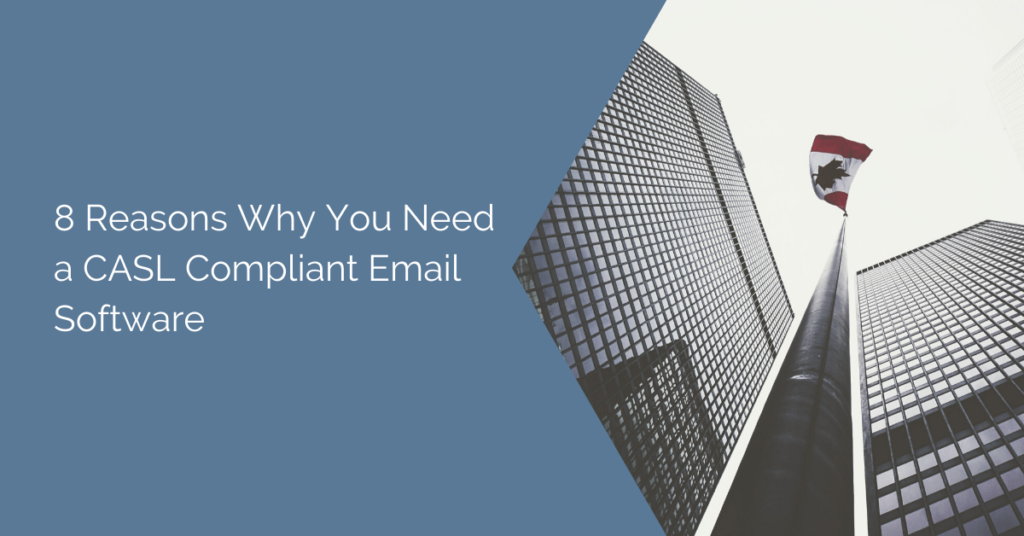CASL compliant email software is essential for organizations sending email in Canada today. Why? Canada’s Anti-Spam Legislation, also known as CASL, is strict privacy legislation that applies to commercial electronic mail (CEM).
It’s a term that triggers concern in the hearts of Canadian email marketers and communicators who fear losing subscribers while they endeavor to obtain the consent required by CASL to legally email people.
But CASL is good. Nobody wants to be spammed, and CASL will ensure Canadians are safe from unwanted email and protect their personal data, too. For companies that rely on email marketing campaigns, the law means adjusting your strategy to comply with CASL.
Using a CASL compliant email marketing platform like Envoke can help you achieve and retain compliance. If you are looking for a better way to manage CASL compliance, perhaps you are ready to try a free, fully loaded Envoke account for 30 days. Our email marketing platform is purpose-built for communicators. We understand your unique needs and have made it our mission to build a product that is tailored to help you remain compliant while managing large subscription lists, and securely communicating with your stakeholders. Give us a try!
Try Envoke today: Create a free trial account.
Email for communication, not lead generation.
- Includes ALL Envoke features.
- No credit card needed for trial.
- Free, unlimited support.
- Free coaching call with tech support (not sales).
Based on our years of experience simplifying CASL compliance for Canadian organizations, we’ll share details about how you can easily keep your mailing list CASL-friendly while maintaining success in your marketing campaigns.
In this article, you’ll learn:
- What is CASL compliance
- How CASL affects email marketing
- Express consent and implied consent: what’s the difference
- 7 CASL consent statuses you must learn about
- 8 reasons you need CASL compliant email software
- How to use CASL compliant email software and manage consent
Here we go.
What is CASL Compliance?
CASL stands for Canada’s Anti-Spam Legislation which went into effect on July 1, 2014. It’s an anti-spam law that applies to electronic messages (emails, SMS) that companies and organizations send as part of their commercial activity.
Regardless of your geolocation, CASL applies to Canadian and global organizations that send electronic messages to Canadian contacts. This means if you’re running a business from Australia and have Canadian email addresses in your database, you must comply with CASL.
As defined in the legislation, CASL applies when these two elements are present:
- Sending commercial electronic messages (CEM).
- Sending CEM to an electronic address in Canada.
This includes emails, SMS, and other messaging to mobile phones and devices.
How CASL Affects Your Email Marketing
Most compliance laws dictate that you must include an opt-out option in your commercial emails and allow your contacts to manage, delete, or update their contact data.
CASL requires more than that. Under CASL laws, you must acquire explicit, documented consent, or have obtained implied consent before you send your emails.
Note that there are exceptions. Not every email sent is subject to CASL.
Explicit consent means that during the opt-in, the contact clearly understands and accepts to receive emails from your organization. CASL requires you to document consent, whether implied or express.
Express Consent and Implied Consent: What’s the Difference?
In CASL, not obtaining a contact’s consent is considered malpractice, which can result in CASL fines. Consent is one of the most crucial factors in Canadian email marketing, and the key to managing consent is to keep records to prove your contacts have given consent.
Using Canadian email software that handles the nitty-gritty of CASL, while you focus on managing and growing your organization, is the most effective way to comply with CASL. This can be a huge time saver as tracking consent changes and rolling expiry dates are automated and don’t have to be done manually.
You can collect your contacts’ consent in two ways: through implied consent or express consent.
CASL express consent
Express consent means your contacts have clearly stated that they’d like to receive your emails using a CASL compliant opt-in form. Obtaining express consent is an asset for your email marketing because this type of consent doesn’t expire.
CASL implied consent
Implied consent means that you obtained the recipient’s email address as a result of a transaction or an inquiry.
The transaction can be:
- Contact makes a purchase,
- Contact requests a quote,
- Contact downloads gated content
An inquiry could be as simple as asking for a quote or filling out a “contact us” form. There are some nuances you should understand, too.
- Implied consent applies to contacts who engaged in a transaction with your organization or made an inquiry without providing express consent.
- Implied consent based on transactions expires 24 months after obtaining.
- Implied consent based on inquiry expires 6 months after it was obtained.
TIP: Use Envoke to send automated consent reminder emails and turn your implied consent to express consent.
7 CASL Consent Statuses You Must Learn About
As an organization sending emails to contacts in Canada, your first step to CASL compliance is understanding consent status. When you use Envoke, you can rest assured that your email marketing platform will understand various types of consent statuses, and who you can send emails to. Here’s a brief overview of 7 CASL consent statuses and how you can satisfy CASL requirements in each instance.
1. Express consent
When you have contacts’ express consent, you can send them commercial emails. Express consent should be obtained and documented. Consent on these contacts does not expire unless they unsubscribe.
2. Implied consent – Based on inquiry
Implied consent based on inquiry is when a contact submits a form without providing express consent. You’re allowed to send commercial emails to these contacts before their consent expires. This type of consent is time-limited; it expires six months after the opt-in date.
Consider asking your contacts to confirm consent to prevent your email list from shrinking. This can be done simply by adding a consent checkbox to the form. The exception is for sales forms, where the presence of a consent checkbox can distract visitors from the main goal of the form. For this reason, a consent checkbox for sales forms is not recommended.
3. Implied consent – Based on transaction
Suppose a customer fills in a form to purchase your product but doesn’t check the express consent checkbox while checking out. Under CASL regulations, you can send emails to contacts in this consent status, but only for a limited time.
Implied consent based on the transaction automatically expires 24 months after the purchase date. Once the consent expires, you’re no longer allowed to send emails to these contacts.
Each contact in your database can have a different expiry date. Managing these rolling expiry dates is a key requirement when you’re using email marketing software like Envoke.
4. Implied consent – No expiry
Expiration dates restrict some types of implied consent, but there are cases where implied consent doesn’t expire.
An example is members of organizations such as alumni or certain associations where opting in to receive emails isn’t required; simply being a member assumes acceptance of receiving emails from the parent organization.
For example, if you’re doing email marketing for educational institutions, your CASL compliant email software allows you to send emails to members of your organization or association.
5. Expired consent
Expired consent is when your contacts’ consent expires six months or two years after the opt-in date. You’re not allowed to send emails to contacts with expired consent. If you do, you’ll risk receiving CASL fines. You should keep track of your contacts’ implied consent expiration dates to make sure you play by the rules.
Use CASL compliant email software such as Envoke to:
- Learn about the consent expiration dates of your contacts.
- Monitor consent status with informative dashboards.
- Automatically send consent expiry reminder emails.
- Upgrade expiring consent to expressed consent.
6. Consent not provided
Consent not provided means that you have neither express nor implied consent. This case is mostly applicable if you’re importing contacts with unknown consent. This status is self-explanatory; consent is not provided and not documented and therefore, you are not allowed to send any emails to these contacts.
7. Revoked consent
Unlike implied consent, revoked consent does not expire due to inaction. Instead, revoked consent is when contacts have revoked consent themselves. When doing email marketing in Canada, you are not allowed to send emails to contacts who revoked consent.
8 Reasons Why You Need a CASL Compliant Email Software
For organizations that are continually growing their email list, it’s almost impossible to keep track of the consent status and consent expiration dates. Manually managing your consent status will require tons of messy Excel sheets and hundreds of hours of work with plenty of opportunity for error
Use CASL compliant email software like Envoke to automatically manage your contacts’ consent and send emails only to contacts you’re allowed to communicate with.
Here are 8 reasons why you should consider using CASL compliant software.
1. Monitor consent status
If you do not keep a close eye on your consent expiration dates, you risk sending emails that you’re not supposed to. And that can lead to paying CASL fines.
Use Envoke CASL consent management software to pass all the messages you send through a CASL compliance filter that checks if each recipient in your target list has a valid consent status. If the consent is valid, the email will be sent. If not, the email won’t be sent. This will eliminate any risk of sending emails to contacts with non-valid consent status.
2. Document and record contacts’ consent
CASL doesn’t only require you to receive contacts’ consent: you also need to document it. CASL compliant email software stores your contacts’ consent data with dates, sources, expiration dates, etc. Envoke keeps a log of all consent changes for each contact record because your documented consent is proof of your eligibility to send emails.
3. Create CASL compliant opt-in forms
Here is the information that you must include in your opt-in form:
- Indicate what you’re asking contacts to opt into.
- Indicate that the recipient can unsubscribe at any time.
If you’re generating leads in Canada, I recommend using Canadian email software that supports compliant opt-in forms.
4. Segment your contacts
With the help of CASL compliant email software, you can segment your email list into four consent categories and make notes on each of the contact records stating:
- When the contact joined your email list.
- The source of the opt-in.
You can use this data to send personalized and targeted email campaigns, which can dramatically increase your engagement. According to Experian, 50% of companies increased interaction within email by increasing personalization.
5. Send automated confirmation emails
After placing an order or joining an email list, subscribers are usually very focused on the success of their transaction and have my questions: Did the order go through? Was the payment accepted? Did my subscription get processed properly? What happens next?
Sending confirmation emails to your new contacts will reassure them, and improve their user experience and impression of your organization.
6. Automate consent expiry reminders
Implied consent for Canadian contacts expires 6 months (after an inquiry) or 24 months (after a transaction) after the opt-in date. To minimize the loss of contacts due to the expiry of consent, send automated reminders to contacts whose implied consent is about to expire to ask them to confirm their subscription.
You can also place reminders in emails that ask contacts to confirm consent if they haven’t already done so. You can do this manually but the better alternative is to use smart reminders that are automatically removed once express consent is obtained.
7. Focus on engaging your contacts and making sales
Once you establish a CASL-compliant email marketing strategy, you can hand the compliance management work to Envoke and spend your time growing your business.
Choosing the right software to manage and automate your compliance requirements helps you play by the rules and keep your business safe from CASL fines.
8. Send mandatory communications
Mandatory communications are emails that need to reach the inboxes of everyone on your list – regardless of their consent status. This means even unsubscribed contacts need to receive these emails. Some situations where this applies include product recall notices, emergency messaging, etc. These emails are exempt from CASL’s consent requirements.
The problem is that most email marketing software automatically excludes unsubscribed contacts from receiving emails. It’s simply not possible to reach these contacts. Envoke’s mandatory communication feature lets you designate select messages as “mandatory” and these emails are sent to every contact even if they are unsubscribed.
How to Use CASL Compliant Email Software to Manage Consent
Envoke is a Canadian email marketing software that offers advanced automated CASL compliance tools, personalized emails, AB testing, email autoresponders, and more.
Since the Canadian Anti-Spam Law went into effect in 2014, Envoke has been dedicated to providing its customers with advanced CASL compliance features. It handles the nitty-gritty of CASL, while you just focus on managing and growing your organization. Here are some of the tasks Envoke can help with.
1. Create CASL compliant opt-in forms:
Create your CASL compliant form in Envoke, where you’ll access a fully customizable form builder. You can design your form to match your brand and website, and you can seamlessly embed it into your website.
Here is a quick preview of Envoke’s drag-and-drop form builder.
2. Monitor your contacts’ consent status:
You don’t have to run through multiple Excel tabs and sheets to learn about your contacts’ consent status. Envoke provides you with an easy-to-understand consent dashboard for you to monitor different consent statuses.

Other email marketing software doesn’t make a distinction between implied and express consent. With Envoke, every email you send will go through the consent filter and it will be sent only to contacts with a valid consent status. Envoke prevents you from communicating with subscribers who removed their consent.
3. Automate consent expiry emails
As implied consent is time-limited, Envoke provides automated consent expiry reminder emails sent to contacts whose implied consent is about to expire.
You can customize the consent reminder emails or direct contacts to the consent and preferences page where they can express their consent.

Although CASL Compliance can seem overwhelming at first, the simple tips in this blog will help you stay on the right side of CASL. Are you looking for a new CASL-compliant email software? If so, then switch to Envoke.
